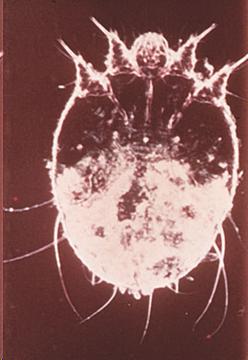
Ectoparasitic Infestations
32

Although they are not infections per se, parasites such as scabies and pubic lice can be spread by sexual contact. Scabies and pubic lice are considered ectoparasitic parasites or infestations since they live on the outer surfaces of the skin.These can be spread by both sexual and nonsexual contact. Scabies is a red intensely itchy rash caused by barely visible mites. It appears on the genitals, buttocks, feet, wrists, knuckles, abdomen, armpits, or scalp. It is the result of mites tunneling beneath the skin to lay their eggs and baby mites making their way back to the surface. It is highly contagious and can spread quickly through close contact including sexual and nonsexual contact, such as linens, furniture, and clothing. Treatment is prescribed lotion applied at bedtime and washed off in the morning. You must also disinfect your clothing, towels, and bedding and washing in hot water and drying in high heat or by dry cleaning to kill the scabies. Pubic lice, AKA crabs, move easily from pubic hair of one to the other. The female produces eggs, which she attaches to the hairs at the rate of three eggs a day for seven to ten days. The nits or the babies hatch within five to ten days and reproduce in two weeks creating a very ticklish or itchy situation. It is transmitted during sexual contact or nonsexual contact through underwear, sheets, towels, where they can live up to a day and lay eggs that hatch in about a week. Symptoms include intense itching, tiny pale crablike louse, or its miniscule pearly nits that are attached at the base of the pubic hair. Treatment includes prescriptions and over-the-counter drugs. You do not have to shave off your public hair to get rid of crabs, but disinfecting includes washing all infected linen and clothing in hot water and drying it in high heat or the crabs may be able to survive.
Image: McGraw Hill